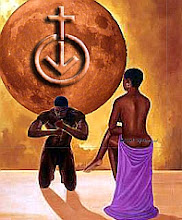I'm not much of a fan of poetry-slam-style spoken word. Moreover, I'm not a fan of rap music at all. However, I find Taalam Acey's insightful critique of the external forces driving the degenerate coonery of the hip hop world to be absolutely riveting. In this piece, he mirrors my own long-held belief that hip hop's descent from its original incarnations as innocuous party music and more serious social commentary into its present state anomic state as a paean to violence, all manner of crime, misogyny and slavish consumerism was driven by the, primarily white, record industry executives who had (perhaps still have)a stranglehold on the dissemination of music.
When rap music fell under the sway of major studios, the genre began to shift away from the more uplifting messages of empowerment espoused by early rap stars, and aimed primarily at a black audience. The big media entities quickly realized that the adolescent white male market, dripping as it was with disposable income, was where the real money was. They also astutely discerned that what this white suburb demographic--who generally hadn't a clue as to the real lives of black folks but nonetheless had a whole mythology of prejudice built up around the dangerous black male archetype--would flock to in droves was hyperbolic displays of black male hyper-masculinity, aggression and criminality.
Tucked away within their insular suburban enclaves, they could vicariously explore their own antisocial desires At the same time, they could accomplish a feat that is seemingly the raison d'être of white American adolescents, pissing off their parents. However, unlike the rappers, whose scowling and dick-holding they found (and still find)so amusing, they could simply turn off the television and go back to a free and easy middle class existence when they'd had their fill. They didn't have to run a gauntlet of crack dealers and gangs, driven to desperation by cyclic abject poverty, on their way to and from school.
In the inner cities, those things were all too real. Even before the advent of gangster rap, poverty-fueled crime was a significant worry for even those with no involvement in any sort of criminal enterprise. However, criminality and ignorance wasn't something to be aspired to. What gangster rap has done is to create a generation of people, many of whom were marginalized to begin with, who have completely embraced a nihilistic rejection of all societal norms. I can remember when the insinuation that someone was a thief (even if they were one) was an affront within the black community that might well have precipitated a fist fight. Nowadays (god, I sound old) kids brag about stealing and robbing. Similarly, a generation or two ago, many people employed the esoteric vernacular of of the streets, but they didn't aspire to it. Now, kids on college campuses go out of their way to speak in broken English, allegedly as a function of "keeping it real." But, in most cases, it is pure affectation. Back in the day, black folks spoke that way because either they or their parents were one or two generations removed from the rural deep south. They lacked education and a facility with standard spoken English. Now, kids, whose parents graduated from at least high school and who spoke a reasonable facsimile of proper English in the home, go out of their way to sound like ignorant jim-crow era sharecroppers, ya heard?
Some people point to the financial successes of a small group of rap impresarios--the Puffies, Jay-Zs and Jermaine Duprees--as evidence that hip hop has improved the economic fortunes of the black community. Nothing could be further from the truth. Rap music has become a cancer in the black community. And, it has produced a generation of black males so inculcated with delusions of overnight success in "the rap game" and so marginalize in their appearance and inability to communicate effectively, that they have difficulty negotiating something so simple and essential to American life as the application and interview process for even a menial hourly job. How these kids could not see that they are being led by the nose by record industry weasel who see their misery as an amusement akin to watching caged animals at the zoo is a mystery to me.
Talaam Acey hit the sociological nail on the head with regard to the white record industry's attitudes toward the black community, whose cultural products they have so profitably exploited, when he said, "The bigger the monkey. The bigger the money ... if you’re effectively rapping about he gun clapping of the black man, say no more nigga, you platinum! ... Just write some bullshit. There’s money to be made for convincing black people that Jill Scott doesn't exist ... As long as white folk got money there’s a market for niggas."









